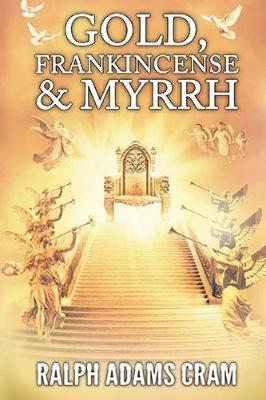
Gold, Frankincense, & Myrrh
Delivery in 2-9 business days.

The title “Gold, Frankincense and Myrrh” means simply this: Gold is the pure, imperishable quality of the monastic ideal, Frankincense the supreme act of worship through the Blessed Sacrament, Myrrh the saving quality of a right philosophy of life that yet must be bitter to the taste of many people. Together they are the three gifts that must again be offered by a world once more led, though now by the red and malefic star of war, to worship and fall down before the Incarnate God so long and so lightly denied.
Foreword by Charles A. Coulombe
As each era of the world reaches its fulfillment, it suddenly festers into five cancerous sores: wealth and luxury, lust and licentiousness, wilfulness and individualism, leading in the end to anarchy, envy and egotism, and finally the idleness
Everything with which and by which our modern era has lived, shatters before us, and no visible foundation remains. Protestantism and free thought, parliamentary government and democracy, natural science, industrial civilization and material efficiency, evolutionary philosophy, pragmatism, determinism, freedom of speech and freedom of the press and compulsory public education — all these, and their myriad concomitants, crumble, totter, and melt away before the Frankenstein monster they themselves had created.
The monk, cloistered, shut away from active contact with the world, living a life of rigid abstinence, praying, praising God and giving himself over to intercession, adoration and worship, is to the world unthinkable, but it is at times like this that the world needs him most.
Our age is dying because it has lost spiritual energy, and therefore no longer knows the difference between the real and the false, the temporal and the eternal, between right and wrong, and this spiritual energy is to be restored, not by action, but by the grace of God, — and by prayer alone is this grace given to men.
We look with disgust on the hedonistic revels of a dying Roman Imperialism; we turn in offense from the sordid corruption of the last years of the Dark Ages; we hold up to scorn and derision the gross licentiousness of Church and State in the Italy of the fifteenth century; but no one of these epochs, base as it is, records a lower fall than the manners and methods and morals of our own modernism when at last the severance had been accomplished and matter, unregenerated and unredeemed, had become Lord of the World, materialism its sacrosanct religion and its law of life.
There was hardly a man in the spring of 1914 who would have denied that modernism had gloriously triumphed, and only a scattered few who doubted its eternity. Then came the epic catastrophe when in an hour the card-castle had crumbled about our ears. The efficiency of material imperialism swept back the inefficiency of an imperialized democracy, and so it has continued for four years. The boasted barriers against war or dissolution, erected one behind the other by finance, capitalism, a socialistic and organized proletariat, universal education, popular government, intellectual and spiritual emancipation, broke, toppled and dissolved, forming only vanishing and impotent ramparts against a triumphant Force released from all bondage to moral standards and spiritual laws.
The Incarnation and the Redemption are not accomplished facts, completed nineteen centuries ago, they are processes that still continue, and their term is fixed only by the total regeneration and perfecting of matter, and the Seven Sacraments are the chiefest among an infinity of sacramental processses which are the agencies of this eternal transfiguration.
Water, chrism, oil, the spoken word, the touch of the hands, the sign of the cross, and finally and supremely the bread and wine of Holy Mass, each a material thing but each representing, signifying and containing some gift of the Holy Spirit, real, absolute and potent. So matter and spirit are linked together in every operation of Holy Church from the cradle to the grave, and man has ever before him the eternal revelation of this linked union of matter and spirit in his life, the eternal teaching of the honor of the material thing through its agency and through its existence as the subject for redemption, while through the material association and the Divine condescension to his earthly and fallible estate (limited by the association with matter to only inadequate presentation) he makes the spirit of God his own, to dwell therewith after the fashion of man.